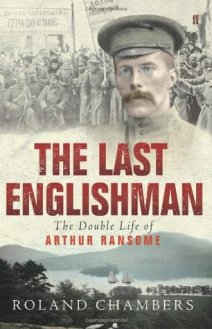
Those whose only knowledge of Arthur Ransome is that he wrote the Swallows and Amazons books will be surprised how little space they take up in The Last Englishman: The Double Life of Arthur Ransome (2009) by Roland Chambers. The bulk of the book is occupied with Ransome’s journalism, in particular his involvement in the Russian Revolution. His life as a journalist was a long way from the nostalgic idyll of boating on the English lakes, and anyone primarily interested in his literary works for children is best advised to turn to other sources.
Chambers sketches in Ransome’s childhood – startling to learn he was taught to ice skate by Prince Kropotkin – and shaky start in a literary career in bohemian London (one suspects that throughout his journalistic career his lack of a degree hampered him when it came to dealing with the British establishment). Then it’s marriage to the nightmare Ivy before Chambers embarks on the heart of the book, and his real interest: picking his way with care through the currents of the Russian situation from before the First World War, though the Provisional Government, Bolshevik power, and on to the rise of Stalinism. In so doing he provides a clear picture of a complex social and political situation, and Ransome’s role as commentator and propagandist within it.
Despite not considering journalism to be his vocation, Ransome’s articles for the Daily News and then the Manchester Guardian were widely read and he was able to use his contacts to gain access to top leaders, including Lenin and Trotsky (Stalin is as marginal here as he was at the time). Karl Radek, his ‘alter ego’ according to Ransome, was a great friend, and Ransome cultivated connections with whoever the top officials were at any given time. He used them for his career, while they saw him as a useful conduit to the western press. Adept at tacking to take advantage of whatever breeze was blowing, he successfully kept his own beliefs close to his chest. He had a knack of being in the right place when it mattered, even managing to be at the Finland Station when Lenin arrived back in April 1917.
Ransome was playing a difficult game, needing to show sympathy to whichever faction was in the ascendency in Russia to be able to do his job, while not closing doors with the government at home. In the process he was having his cake and eating it by offering his services as a British agent, reporting on the Russian situation. His position became more problematic when he found himself being positive about the Bolsheviks while the British government was supporting a White invasion of the country during the Civil War. Later, less forgivably, he downplayed the Red Terror in his articles.
Generally, however, it was a double game Ransome played well, taking advantage of the opportunities offered him. He had a good grasp of the currents sweeping Russia when outside observers were struggling to make sense of it all, though his sympathy for the regime caused problems for his reputation at home and in the United States. The last word on Ransome’s activities will not be possible until all the government files are available, but in the meantime Chambers has done a good job in rounding out the divided loyalties Ransome displayed in his reluctant career as a journalist.
Unable to cope with the tensions inherent in trying to ride two horses, he was happy to give up the newspapers and get back to literature, which he saw as his true vocation, and the gentlemanly pursuits of walking, fishing and sailing. Despite the Bolshevik baggage and a Russian second wife he gained a measure of respectability, achieving a CBE and even, to top his other triumphs, membership of the prestigious Royal Cruising Club.
In contrast to his accidental career as a journalist, his domestic life was not terribly successful, with a rigid and judgemental father and wildly incompatible first wife, leading to lengthy separations and consequent estrangement from his daughter. Not keen on facing his responsibilities, his usual strategy when faced with a difficulty was to run away. But he had a happy second marriage to Evgenia Shelepina, Trotsky’s secretary, possibly saving her life by taking her to England, though her sedate existence as a housewife must have been a wrench after the heady days of revolutionary life in Russia.
Throughout, Chambers demonstrates the contradictions in Ransome’s character. He could be self-serving, yet he had considerable personal charm, able to get along with individuals from all strata of society, and he could be generous. Described as cowardly, he put himself in stressful and sometimes dangerous situation despite his unreliable health: he suffered gastric ailments and Evgenia nicknamed him Charlie on account of him walking like Charlie Chaplin when his piles were particularly irksome.
Chambers draws out the strangeness of Ransome, moulded by his late Victorian and Edwardian upbringing and happiest when holding a fishing rod or in a small boat, being thrown by circumstances into one of the most turbulent periods in modern history, finding himself rubbing shoulders with people who possessed opinions vastly at odds to those he had grown up with, yet able to meet them on their own terms. It is a great pity he never produced a book on Russia to rival John Reed’s Ten Days that Shook the World.
